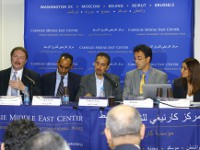Registration
Thank you!
You will receive an email confirming your registration.
The collapse of the Qaddafi regime has created an exceptional opportunity to enact the extensive political, economic, and social changes required to transform Libya. Unlike in Tunisia or Egypt, political structures and state institutions will have to emerge completely from scratch.
A recent conference in Beirut hosted a diverse group of experts to discuss the critical issues facing Libya. In a talk moderated by Carnegie’s Lahcen Achy, Saoussen Ben Romdhane of the African Development bank, Emanuele Santi, Dartmouth College’s Diederick Vandewalle, and Tarik Youssef, CEO of Silatech, discussed Libya’s future and whether its new leadership will be able to rebuild a modern, stable, and sustainable country.
The “Curses” Plaguing Libya
Youssef described the main challenges facing Libya as “curses:”
- The Curse of History: In particular, he pointed to the 40 years of stagnation under the Qaddafi regime.
- The Curse of Oil: Oil administration in Libya is characterized by a rentier system and corruption, he explained.
- The Curse of Qaddafi: Youssef described the atrocities committed by Qaddafi against his people as a curse that Libya must overcome.
- The Curse of Conflict: The long conflict to free the country of the regime has had a heavy toll on the Libyan economy, he added.
Youssef emphasized that the war of liberation, while painful, was not an externally driven process. While the importance of international intervention is debatable, he argued it is clear that Libya’s liberation is undeniably and intrinsically connected to the Arab Spring.
The Main Issues within Libyan Society
- Tensions in society: Youssef identified a number of divisive issues within Libyan society that have been concealed in the past due to the supreme dominance of the Qaddafi regime, including tensions between:
- Urban and rural populations;
- City dwellers and Bedouins;
- Tripoli and Benghazi;
- Domestic nationalism, including nationalist movements by Amazighi, Tebo, and Touareg populations;
- Qaddafi loyalists and rebels;
- Islamists and liberals.
- A lengthy process: Transition, Youssef concluded, is a long term project. The country will need charismatic and visionary leadership as well as the participation of Libyan technocrats and intelligentsia, if it hopes to move in the right direction.
- Elections: While calls for elections in countries affected by the Arab Spring have drawn global attention, Youssef argued that the revolutions within these countries do not revolve around elections. Rather, they occurred because of an overwhelming concern for economic and political transition toward rule of law, transparency, and accountability. He advised the interim government to focus closely on building a common national space between citizens before venturing into elections.
State Building Versus Nation Building
Vandewalle argued that Libya faces two primary priorities:
- State building: The short to medium-term process of developing functional and efficient state institutions that can properly govern the country is essential. In addition, Libya must develop a coherent and viable governance framework that connects these institutions, which Vandewalle described as “the rules of the game for the Libyan state.”
- Nation Building: Libya must also engage in the long term process of creating the confidence, legitimacy, and consensus that gives relevance to state institutions and create a space of national unity in which Libya can thrive.
Vandewalle argued that state building and nation building go hand-in-hand. However, the many divisions that plague the Libyan society will make the process of promoting a sense of national identity more difficult.
Effect of Libyan Revolution on Tunisia
Santi and Ben Romdhane examined how the conflict in Libya creates challenges and opportunities for its neighboring countries.
- Effect on Tunisia: Their study outlines how the Libyan crisis has so far had a negative effect on Tunisian trade, tourism and services, foreign remittances, and foreign direct investment.
- After Tripoli: However, Santi and Ben Romdhane added that there has been some positive momentum since the liberation of Tripoli.
- Regional integration: The Arab spring could offer an opportunity for the countries of the Maghreb region to engage in further regional integration and economic cooperation, they added.
